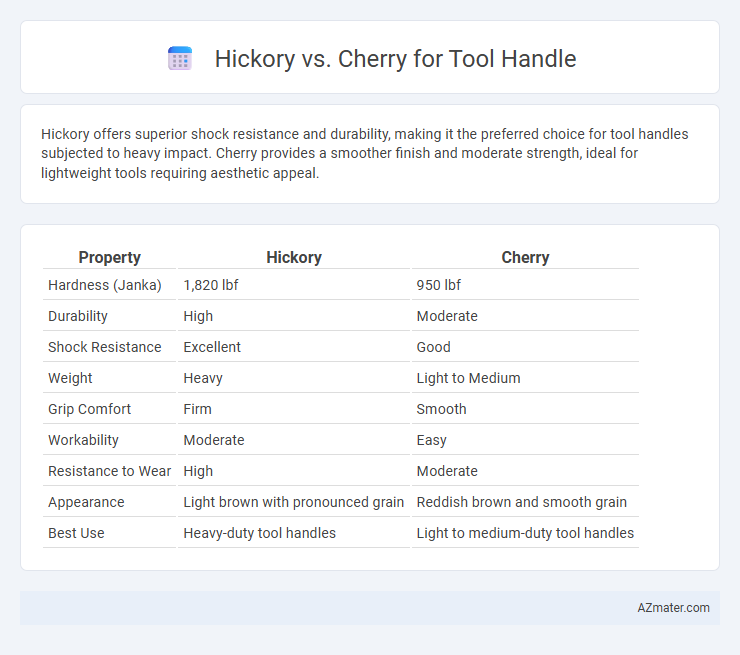Hickory offers superior shock resistance and durability, making it the preferred choice for tool handles subjected to heavy impact. Cherry provides a smoother finish and moderate strength, ideal for lightweight tools requiring aesthetic appeal.
Table of Comparison
| Property | Hickory | Cherry |
|---|---|---|
| Hardness (Janka) | 1,820 lbf | 950 lbf |
| Durability | High | Moderate |
| Shock Resistance | Excellent | Good |
| Weight | Heavy | Light to Medium |
| Grip Comfort | Firm | Smooth |
| Workability | Moderate | Easy |
| Resistance to Wear | High | Moderate |
| Appearance | Light brown with pronounced grain | Reddish brown and smooth grain |
| Best Use | Heavy-duty tool handles | Light to medium-duty tool handles |
Introduction to Hickory and Cherry Wood
Hickory wood is renowned for its exceptional strength, shock resistance, and durability, making it a preferred choice for tool handles that require high impact absorption. Cherry wood offers moderate hardness with a smooth texture and rich reddish hue, valued for its aesthetic appeal and comfortable grip in tool handles. Both woods provide unique advantages, with hickory excelling in toughness and cherry in elegance and workability.
Key Characteristics of Hickory Wood
Hickory wood is highly favored for tool handles due to its exceptional strength, shock resistance, and durability, making it ideal for absorbing impact during heavy use. Its dense grain structure provides superior toughness and flexibility, reducing the likelihood of handle breakage under stress. Hickory's ability to withstand wear and repeated striking sets it apart as a premium material for ergonomic, long-lasting tool handles.
Key Characteristics of Cherry Wood
Cherry wood features a fine, uniform grain that offers a smooth finish, making it ideal for tool handles requiring comfort and precision. Its moderate hardness provides a balance of durability and shock absorption, reducing hand fatigue during prolonged use. The wood's natural reddish-brown hue also enhances the aesthetic appeal of tool handles while developing a rich patina over time.
Durability and Strength Comparison
Hickory offers exceptional durability and impact resistance, making it a preferred choice for tool handles subjected to heavy use and frequent shock. Cherry wood, while strong and aesthetically appealing with a smoother finish, is generally less resilient under repeated stress compared to Hickory. For tools requiring maximum strength and long-lasting performance, Hickory is typically the superior option due to its dense grain structure and natural shock absorption properties.
Shock Absorption Abilities
Hickory wood offers exceptional shock absorption properties, making it a preferred choice for tool handles subjected to repetitive impact and vibrations. Cherry wood, while durable and aesthetically pleasing, has less natural shock resistance compared to hickory, resulting in more transmitted strain to the user's hand. For tools requiring maximum comfort and reduced fatigue during prolonged use, hickory handles provide superior vibration dampening and durability.
Weight and Workability
Hickory is heavier and denser than cherry, providing superior shock absorption and durability for tool handles in heavy-duty applications. Cherry wood is lighter and offers smoother workability, making it ideal for handles requiring precision and ease of shaping. The choice depends on whether weight resistance or ease of craftsmanship is prioritized in tool handle manufacturing.
Comfort and Ergonomics
Hickory excels in tool handle comfort due to its superior shock absorption and natural strength, reducing user fatigue during extended use. Cherry offers a smooth, fine grain that enhances grip ergonomics and provides a warm, tactile feel, although it is slightly less impact-resistant than hickory. Both woods deliver reliable ergonomic benefits, but hickory's resilience makes it the preferred choice for heavy-duty hand tools requiring long-term comfort.
Aesthetic Appeal and Grain Patterns
Hickory tool handles feature a pronounced, straight grain pattern with a pale to medium brown color, providing a rugged, traditional aesthetic. Cherry wood offers a smoother, finer grain with a rich reddish-brown hue that deepens over time, lending an elegant and warm visual appeal. Both woods are prized for their unique aesthetics, yet cherry stands out with its rich color transformation and refined grain complexity.
Price and Availability
Hickory tool handles are generally more affordable and widely available due to the tree's abundance and fast growth rate, making them a cost-effective choice for manufacturers and consumers. Cherry wood handles tend to be pricier with limited availability, as cherry trees grow slower and the wood is often reserved for fine furniture and specialty woodworking. The price difference reflects these factors, with hickory offering durability and accessibility at a lower cost compared to the premium aesthetic and scarcity of cherry handles.
Best Applications for Each Wood Type
Hickory excels in tool handles requiring high shock resistance and durability, making it ideal for hammers, axes, and other heavy-impact tools due to its exceptional strength and flexibility. Cherry wood offers a smoother finish and moderate strength, best suited for ergonomic handles on hand tools like chisels and screwdrivers where comfort and aesthetics are prioritized. Choosing Hickory ensures maximum toughness and longevity under repeated stress, while Cherry provides a refined grip and visual appeal for less intensive use.

Infographic: Hickory vs Cherry for Tool Handle
 azmater.com
azmater.com